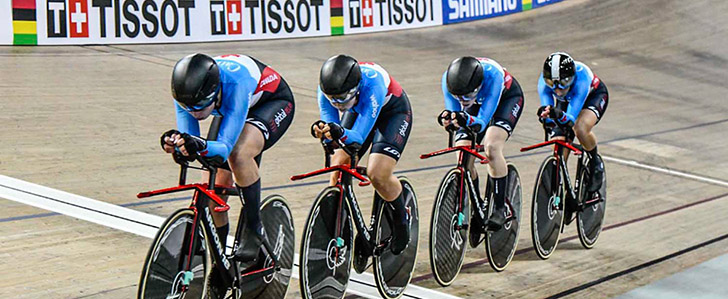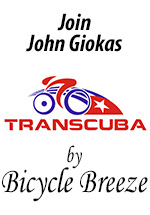November 30/06 12:02 pm - Anne Samplonius Speaks Out
Posted by Editor on 11/30/06
A Cyclist Speaks Out
In response to the latest news that Genevieve Jeanson has signed a contract with USADA (United States Anti-Doping Agency) allowing Ms. Jeanson to admit her guilt and be sanctioned with a two year period of ineligibility, thereby foregoing any further appeals, lawsuits, or litigation regarding her positive drug test, I wrote the following letter addressed to USADA:
Dear USADA:
It's me again.
It has been two years and I want to extend my congratulations in your ongoing fight against drug use in our sport.
You win.
I am more confused then ever.
But the dopers? You continue to open the door wider and wider for them.
The confusion of what constitutes a doping infraction and its penalties in the USA continues to astound me. So let me try to understand. Genevieve Jeanson should of served two years for her first infringement but instead gets a warning and a fine. Then her second positive result, which is supposed to be an automatic lifetime suspension, is now settled for a mere two year sentence? This settlement is quite a good one. Ms. Jeanson is allowed to state that she did not take EPO specifically but still admits her guilt as is written in line 8 of your contract with Ms. Jeanson:
8. Ms. Jeanson acknowledges that the positive test report from the UCLA Laboratory is a violation of the applicable rules, including the USADA Protocol and the UCI Anti-Doping Rules, both of which have adopted the WADA Code, and accepts the following:
A two-year period of ineligibility under Article 10 of the WADA Code beginning on July 25, 2005;
Let's see if I got this right: Ms. Jeanson admits her guilt of something (just not EPO) and retracts her appeal to AAA/CAS allowing her to "get out of jail" by July 2007 instead of serving a life sentence, and you get out of more lengthy and costly legal battles, so it's a win-win situation for both USADA and Ms. Jeanson.
But what about the rest of us? What about cycling's future? What message do you send to young athletes when you continue to handle doping infractions according to your own laws, and allow settlements with the guilty to satisfy your own needs?
I am more confused and disheartened then ever. I have now lost faith in the entire system. How does this look to the future of our sport? Or did you fail to see that such a settlement has implications that reach further then those simply between USADA and Ms. Jeanson?
Truly depressed
Anne Samplonius
Canadian Pro Cyclist
After this letter was posted on Velonews.com I received an email from USADA council Travis Tygart asking permission to give USADA's point of view. I was more then happy to hear what USADA had to say as I wanted to find out how they could in this specific case lessen the sanction of Ms. Jeanson for what appeared to be their own benefit. I wanted to hear that they were an anti-doping organization dedicated to eliminating the practice of drugs in sport, and that they had not acted in their own selfish needs to avoid more costly and lengthy appeals by reaching a settlement with Ms. Jeanson. I wanted USADA to convince me that the judicial system in the world of sport was not working in favour of the dopers. I wanted to hear that they were, in fact, on our side because everything about this contract with Ms. Jeanson reeked the opposite. To me it was simple: If Ms. Jeanson is innocent then let her prove her innocence by allowing her an appeal hearing with AAA/CAS (American Arbitration Association/North American Court of Arbitration for Sport) panel . If she is guilty, then the sanction according to the WADA Code is a lifetime ban.
After listening to Mr. Tygart I am convinced that USADA acted in the best manner that they could and I stand corrected. I was very disillusioned after the contract came out, but what myself and probably most everyone does not know, and what USADA probably needed to write in conjunction with their contract, is that a two year sentence was the most that Ms. Jeanson was ever going to receive. Why? Because her first infraction in April, 2004 (when she missed the post race drug test at Fleche Wallonne) was ruled a "no fault" violation. Even though this is considered her first offence a "no fault" ruling means that a period of ineligibility (in the case of a missed drug test this can be from three months to two years) is eliminated. This elimination of any ineligibility in Ms. Jeanson's first violation means that her second violation cannot receive the sanction of a period of lifetime ineligibility according to the WADA Code. Technically this is Ms. Jeanson's second violation but the WADA Code has a loophole in this specific case to not impose the lifetime ban. At most she can only receive two years. These loopholes in the WADA Code are there to allow flexibility in individual case management. WADA, according to Mr. Tygart, is currently working to rewrite a new code (which will not be completed for at least another year) as they evaluate such loopholes, in order to further advance anti-doping efforts.
So while this contract signed between WADA and Ms. Jeanson gives the appearance that USADA "gave in" and lessened the sanction of Ms. Jeanson this is not the case. USADA was able to achieve the maximum sentence for Ms. Jeanson and also able to avoid thousands of dollars in appeals and another year or more of their time in fighting another doping infraction. What I have learned in all this is that often there is more going on behind the scene than we, the general public and athletes, realize. I have in the past pointed my finger and wrongly accused USADA in not doing enough to combat the use of drugs in cycling, when actually they are doing all they can within the current system. It is really the system that has it's flaws and loopholes which in certain cases allows violators an easier way out. No system is perfect and WADA has done it's best up to this point to make the Code as fair as possible. They are currently reviewing the Code to build on the experience gained to date in order to make improvements.
I have also learned that we as athletes cannot sit back and say nothing and then complain of continual drug use in our sport. We need to work with organizations like USADA, WADA and CCES (Canadian Centre for Ethics in Sport) if we are serious about winning the battle against drug use. As athletes we need to take a stand and make our voices heard. One way, possibly, is to request an increase of the current sanctions. Mr Tygart suggested that the athletes should demand more then a two year period of ineligibility for the first offence. I agree. If we want to really clean up sport and rid it of drug cheats we need to impose greater penalties. It is far too easy for offenders to make their way back into competition.
In the end, it's up to us.
Anne Samplonius
| Return to Canadian Cyclist homepage | Back to Top |





